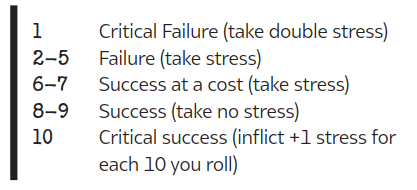Alright, I've started working on Hwaet, which is based on the Resistance toolkit. For those not familiar with it, the Resistance toolkit is what covers Rowan, Rook, and Decard's excellent Spire (affiliate link). They've got a Kickstarter running for Strata, a supplement for Spire that promises new heights (and depths) to the setting.
What I've gotten done so far.
I've got relatively little in the way of rules, and much of what I'm doing right now is just porting the Resistance Toolkit over to Hwaet's development document. I'm selling my soul to Google for this one; I'm sketching out my ideas in Google Keep and then transferring them over to a Google Doc, and I've just about hit the point where the unique differentiation would come into play, but I haven't actually ported it into the document yet.
Why the Resistance Toolbox?
I really like Spire's ruleset, and I think that there are a couple reasons that can underscore this really neatly.
First, it's lightning fast. As someone who's spent hours agonizing over how to streamline my own ruleset, it's refreshing. In Hammercalled we take tens-place dice so people don't have to do math to calculate a degree of success. That's an attempt (misguided or not) at streamlining that shows how extreme I like to go with playing quickly, and it goes back to 1km1kt.net discussions about how math can impact play at the table.
Spire does away with that by making each roll simply be a means to an end, and the result indicates what sort of result occurs.

Table from the Resistance Toolbox, by Grant Howitt and Chris Taylor
Strong characters roll extra dice and take the best result, which allows for meaningful character growth without going into a whole lot of numbers.
Honestly, the only thing I don't like about it is that I didn't think of it first, but I'm not too proud to pay the CC-BY tax. There are some limitations to how much granular detail you can give, but honestly I think that you run down some philosophical rabbit trails very quickly that way. You get from 1-4 dice, based on a number of factors, and that's honestly all the resolution you need to have a fair amount of definition to characters.
The Resistance Toolbox presents complete (some assembly required) rules for narrative-focused storytelling that fit into twenty pages, are incredibly elegant, and can hold a lot of weight.
There's great result variance, so you don't run into situations where you have no-threat scenarios but you also won't get too many crazy wild results.
The best part, however, is that it's not going to give you spreadsheets. After working on Hammercalled, I'm really excited by one thing:
The character sheet for Hwaet will not have numbers on it (actually, that's a lie–I'll include a copy of the success table above–but the characters themselves will be entirely built without numbers).
With that said, I am sort of rewriting the toolbox into my own language as I go. I don't know that this is improving it, but it is at least adding a slightly different flavor to it. There are a few things in the organization that I think are just hard to fit, and it's not so much that I disagree with where they're placed in the original design but that the things I'm adding to the system are going to make more sense in a different light.
Your post was upvoted by the @archdruid gaming curation team in partnership with @curie to support spreading the rewards to great content. Join the Archdruid Gaming Community at https://discord.gg/nAUkxws. Good Game, Well Played!
Downvoting a post can decrease pending rewards and make it less visible. Common reasons:
Submit